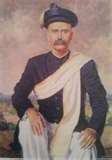Gopal Ganesh Agarkar
Gopal Ganesh Agarkar (14 July 1856 – 17 June 1895) was an Indian social reformer, educationist, and thinker from Maharashtra, India.
Gopal Ganesh Aagarkar | |
|---|---|
 Gopal Ganesh Agarkar | |
| Born | 14 July 1856 Tembhu, Satara district, Maharashtra, British India |
| Died | 17 June 1895 (aged 38) Pune, India |
At one time a close associate of Bal Gangadhar Tilak, he was a co-founder of educational institutes such as the New English School, the Deccan Education Society and Fergusson College along with Tilak, Vishnushastri Chiplunkar, Mahadev Ballal Namjoshi, V. S. Apte, V. B. Kelkar, M. S. Gole and N. K. Dharap. He was the first editor of the weekly Kesari and founder and editor of a periodical, Sudharak. He was the second Principal of Fergusson College and served that post from August-1892 until his death, aged around 39.
Early life
Gopal Ganesh Agarkar was born in a Chitpavan Brahmin family[1][2] on 14 July 1856 in Tembhu, a village in Karad taluk, Satara district, Maharashtra. He was a friend of Nilkanth Tidke[3]
Agarkar was schooled in Karad and then worked as a clerk in a court there.,In 1878, he got his B. A. degree, and in 1880 was awarded an M.A. 1892 to 95 Principal of Ferguson college
Achievements and philosophy
He was the first editor of Kesari, a prominent Marathi-language weekly newspaper that had been founded by Lokmanya Tilak in 1880-81. Ideological differences with Tilak caused him later to leave: they disagreed regarding the primacy of political reform versus social reform; with Agarkar believing that the need for social reform was more immediate. He started his own periodical, Sudharak, in which he campaigned against the injustices of untouchability and the caste system. Agarkar abhorred blind adherence to and glorification of tradition and the past. He supported widow remarriage.[4]
Publications
Agarkar writes in his biography in the "Futke Nashib" that he was the only social worker who witnessed his own funeral, He has also written a book 'Alankar Mimmansa' (अलंकार मीमांसा) "Dongarichy Turangatil 101 divas 1882" "Vikar visit 1883" Hamlet the Marathi bhashantar. He also did the translation of hamlet book.
He was the first writer of Kesari newspaper.
Due to severe asthma, Gopal Ganesh Agarkar died on 17 June 1895
References
- Mohammad Shabbir Khan (1992). Tilak and Gokhale: A Comparative Study of Their Socio-politico-economic Programmes of Reconstruction. APH Publishing. p. 10.
In another important aspect the another year was also significant as in the rank of faculty members, Gopal Ganesh Agarkar (1856-1859) joined. Agarkar was a brilliant Chitpavan Brahmin, M.A. at the Deccan College when Tilak met him first.
- Richard I. Cashman (25 September 2018). The Myth of the Lokamanya: Tilak and Mass Politics in Maharashtra. University of California Press. p. 222. ISBN 978-0520303805.
- Anonymous. "Gopal Ganesh Agarkar". "Social Reformers". Maharashtra Navnirman Sena. Archived from the original on 6 October 2011. Retrieved 24 October 2010.
- Tarique, Author. Modern Indian History. Tata McGraw-Hill. p. 8.10. ISBN 978-0-07-066030-4. Retrieved 24 October 2010.
Further reading
- S. M. Garge [स मा गर्गे]. Gopal Ganesh Agarkar [गोपाळ गणेश आगरकर]. National Book Trust, India. ISBN 81-237-1745-8.
- Aravind Ganachari [अरविंद गणाचारी]. Gopal Ganesh Agarkar - The Secular Rationalist Reformer. Popular Prakashan, India. 2005. ISBN 81-7991-226-4 (3974).